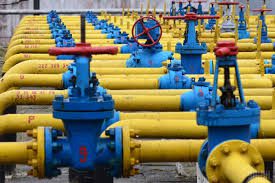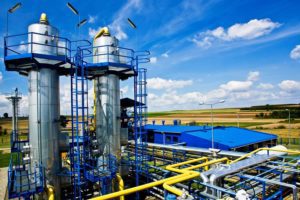
Production of natural gas in Ukraine in January-July 2019 increased, according to recent data, by 1.8% (by 216.3 million cubic meters) compared to the same period in 2018, to 12.188 billion cubic meters, according to data from JSC Ukrtransgaz.
According to the calculations of the Interfax-Ukraine agency, gas production by Ukrgazvydobuvannia amounted to 8.868 billion cubic meters (0.3% more compared to January-July 2018), by PJSC Ukrnafta to 672.7 million cubic meters (10.2% more), and other companies to 2.648 billion cubic meters (5% up).
In July 2019, gas production amounted to 1.697 billion cubic meters (4.1% less compared to July 2018), in particular by extraction by Ukrgazvydobuvannia totaled 1.207 billion cubic meters (7.4% less), Ukrnafta some 97.1 million cubic meters (7.8% more), and other companies some 392.9 million cubic meters (up by 4.7%).
Oil transit via Ukraine to Europe grew 4.4% year-on-year in January-July 2019, to 53.191 billion tonnes, according to preliminary data from Ukrtransgaz.
According to calculations made by Interfax-Ukraine, transit of gas to Europe totaled 51.512 billion cubic meters (an increase of 4.6%), and transit to Moldova came to 1.679 billion cubic meters (down by 0.8%).
In July, gas transit decreased 4.1%, to 8.112 bcm. Transit to Europe fell by 4.3%, to 7.948 billion cubic meters and to Moldova rose by 8%, to 163.9 mcm.
In 2018, gas transit decreased by 7.1%, to 86.779 bcm. Transit to Europe fell 7.6% to 83.839 billion cubic meters; transit to Moldova rose 8.6% to 2.94 bcm.

Ukraine pumped 2.306 bcm into its underground gas storage facilities in July, the highest figure for any month in the last four years, according to preliminary data from Ukrtransgaz.
As of July 31, 2019, the country’s stocks totaled 15.85 bcm, which is 3 bcm more than a year before.
If maintained, this tempo will allow Ukraine to reach its goal of starting the next heating season with 20 bcm in underground storage.

Shebelynka gas processing plant in Kharkiv region in January-June 2019 increased processing of crude oil by 7.6% (17,400 tonnes), compared to the same period in 2018, to 246,900 tonnes.
The Ministry of Energy and Coal Industry told Interfax-Ukraine that in June 2019 processing at the plant amounted to 40,300 tonnes, which is 6.1% (2,600 tonnes) more than in the same month last year.
For the six months, the plant increased production of petrol by 37.3% (by 21,800 tonnes), to 80,300 tonnes, fuel oil by 5.4% (by 2,300 tonnes), to 45,200 tonnes, but reduced diesel fuel by 27.2% (by 3,700 tonnes), to 17,300 tonnes.
The loading of the plant’s capacity through the aforementioned period of 2019 was 49.4% against 45.9% in 2018.
Ukrgazvydobuvannia, 100% owned by Naftogaz Ukrainy, is Ukraine’s largest gas producer, which provides about 75% of the total gas output in the country.
Ukrgazvydobuvannia operates Shebelynka gas refinery, Yablunivske department to process gas, Bazylivschyna condensate stabilization unit, and 19 filling stations in Kharkiv region. The latter sells fuel and liquefied gas of its own production.

Ukraine is utilizing 100% of its existing capacity for importing natural gas, Serhiy Makohon, the head of Gas Transportation System Operator of Ukraine, has said.
“The day has come! Imports of gas reached 66.3 million cubic meters, which represents 100% of our technical capacity. A landmark event,” Makohon wrote on Facebook.
The GTS’ throughput capacity on Ukraine’s border is 42.5 mcm/day from Slovakia, 19.5 mcm/day from Hungary, and 4.3 mcm/day from Poland.
Ukraine is planning to start the 2019/2020 heating season with 20 billion cubic meters of gas in its underground storage facilities, as it fears that Russia’s Gazprom will stop transporting gas through its territory after this year.
As of the morning of July 20, some 15.018 bcm was in underground storage, CEO of Naftogaz Ukrainy Andriy Kobolev said on Facebook earlier on Monday.
Between July 1 and July 20, some 1.473 bcm was pumped in, or 73.7 mcm per day. In June, 71.9 mcm/day was pumped in, and 62.9 mcm/day in May.

Russia’s Gazprom has boosted gas transit to the European Union through the territory of Ukraine by 25%, by 60 million cubic meters per day, JSC Ukrtransgaz has reported.
This is related to a halt for repairing two lines of Nord Stream.